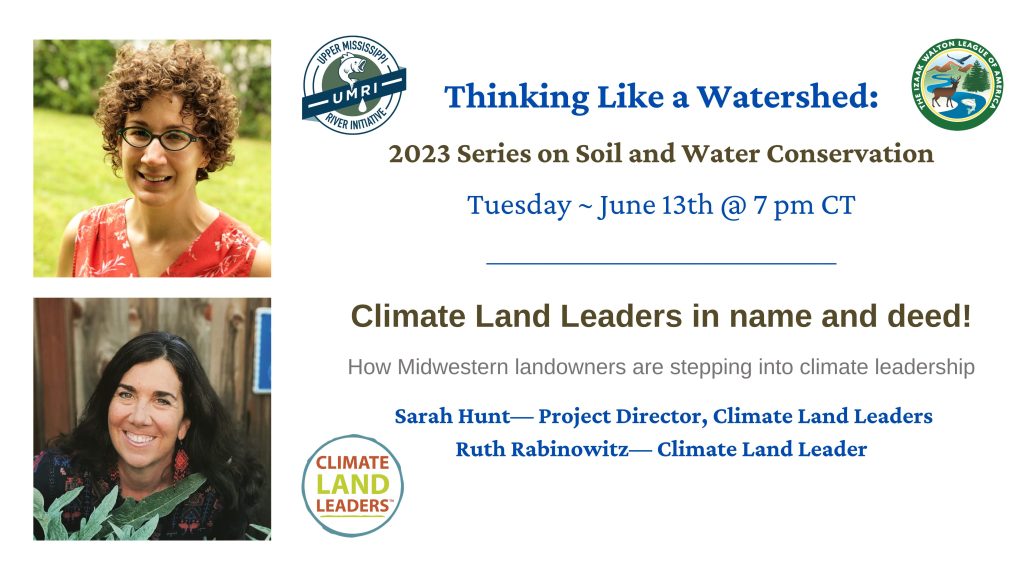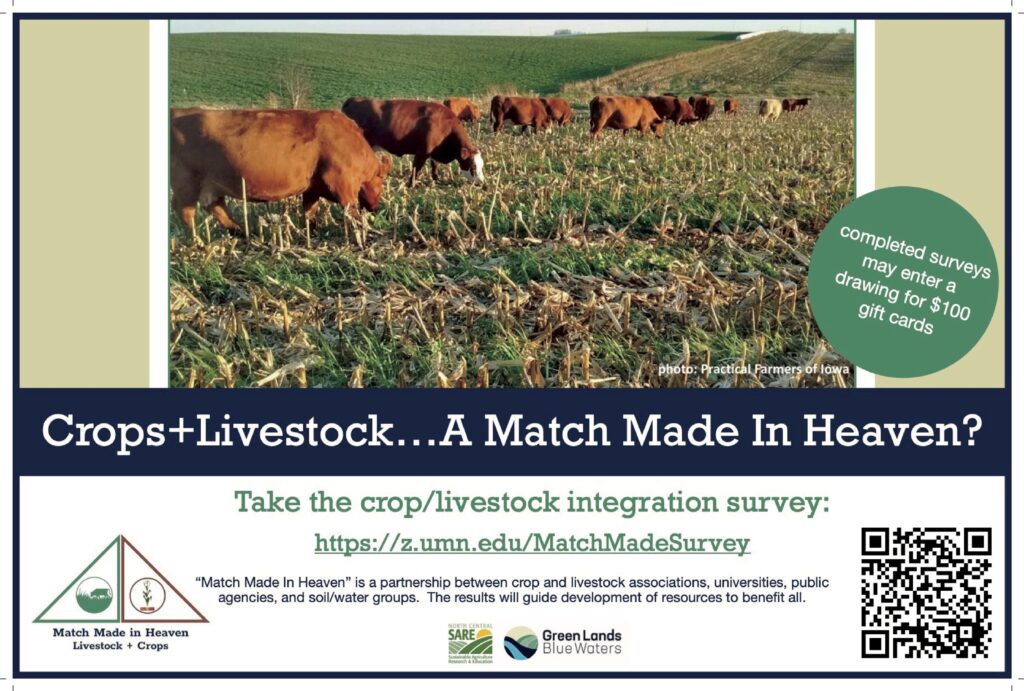But first!
The month of May was busy in such ways that for those among us who hold out hope for humanity and the planet, one might actually feel good. In collaboration, always collaboration with Driftless partners of many stripes, we co-organized a nitrate contamination forum, trained stream monitoring volunteers and got some of them out on public waters at our Driftless sites, hosted a dynamic “Thinking” webinar on river health and diversion issues, and secured our final webinar guests for June 13, 2023.
But next!
That said, “Unfortunately, my esteemed Minnesota colleague has resigned as of the end of this month. I’d like to thank her for all of her conservation contributions with our UMRI programs throughout the past couple of years. Caroline demonstrated and impacted positive conservation on the ground in Minnesota’s driftless area, while addressing soil health and clean water. She accomplished this through local networking with many individuals from many communities and organizations. We’re extremely grateful for her services and we’re already feeling the void.”, Christine Curry, UMRI’s Iowa Outreach Coordinator
Join us via Zoom…Tuesday, June 13, 2023 @ 7 pm CT
Izaak Walton League’s Upper Mississippi River Initiative’s
Thinking Like a Watershed in 2023—

Climate Land Leaders in name and deed!
Sarah Hunt— Program Director, Climate Land Leaders
Ruth Rabinowitz— Climate land leader
How Midwestern landowners are stepping into climate leadership.
Register Here!
After registering, you will receive a confirmation email containing information about joining the meeting.
“Thinking” hears out Climate Land Leaders in name and deed
Our June 13, 2023 “Thinking Like a Watershed” webinar series finally gives voice to a group we’ve been hearing much about and are so pleased to host: Climate Land Leaders. It’s an organization and it’s also the 80 or so members who look at an undeniable shift in the environment of weather, turn to their land, and act accordingly. This is our last webinar; please join us at 7 p.m. Central for an hour of education and discussion about what we can change if we own a few acres and are serious about soil, water, and carbon.
“Agriculture is a climate problem — and a climate solution. With compassion, creativity and collaboration, Climate Land Leaders are working toward solutions.” So states the home page of the Midwest-based Climate Land Leaders (CLL), begun with 15 landowners and farmers and now is ‘home’ to more than 80. Members work together to change their land practices to increase carbon sequestration and reduce greenhouse gas emissions. They engage in policy advocacy that shifts public investment to “ecosystem services.” Habitat, soil health, and agriculture as a solution, not just the problem, define their work using the one tool they alone can wield: the farm and forest land they steward.
Then, things get different. CLL explicitly wants to affect 75,000 acres of Midwestern farm and forest land by December 2024. Members express their actions as a response to a rapidly changing climate. They think expansively about how to use their resources to address inequities and the next generation of farmers and land stewards. And they are clear – they are in this together. What is it about CLL that works for its members and what is uppermost on their minds this year?
This monthly series is a project of the Upper Mississippi River Initiative (UMRI) of the Izaak Walton League of America, with co-hosts Christine Curry of UMRI, Chris Henning of the Panora Conservation Chapter, and Des Moines Chapter Communication Director, Bud Hartley. We feature guests for 30-40 minute presentations that shed daylight on good works done in the name of the Mississippi and its uplands. In this way we uplift our shared goals for a cleaner river, a cared for environment, and kinder communities. Recorded programs are available at UMRI’s resource page shortly after they air live.
Oh, and don’t forget to register!
Eyes on public waters

Indoors and streamside, 20 wanna-be Save Our Stream (SOS) volunteers spent most of Saturday, May 20, 2023, on and near Garvin Brook in Winona learning the protocols. Certified trainer, Dr. Jenny Biederman, along with three experienced SOS volunteers (a shout out to Amy Cordry and Barry Drazkowski!) gave students a hands-on experience under blue skies. Several have already passed their online components and are about to participate in the last of our Driftless spring monitoring. By way of background, chemical and biological data are uploaded to a searchable hub and are used at the federal level to inform water policy and practices. The data also serve as talking points in communities working for safer water. Minnesota’s Austin chapter is a case in point, applying their data results to successfully help close loopholes in the county septic ordinance. Stream team volunteers in Winona County are establishing sampling sites along Rush Creek as part of an effort to address recurring fish kills. Funding for the workshop was provided by the IWLA Endowment Fund and the Will Dilg chapter. Photos by Caroline van Schaik



Water forum on nitrate contamination brought out 115 concerned well users. Water contamination in karst and corn country is not new and it has additional twists in Winona County because of Driftless geology. Last month, a coalition of organizations led by the Minnesota Center for Environmental Advocacy filed a petition for emergency EPA intervention in the region because of failure to act by state and local agriculture and health agencies. The Minnesota Division of IWLA is a party to the petition. The May 22, 2023 education event in Lewiston proved a timely follow up that included the MCEA’s Water Program Director, Carly Griffith. Griffith joined four others to address fly fishing, economics, human health, and water biology of excessive nitrate contamination found in Driftless region well water. The Winona County Clean Water Coalition, which includes the Will Dilg chapter of IWLA, can be contacted here! The entire petition is here!
“Thinking” recordings
The recording to the May program is available now: “The Mississippi today, and do we send it away?” : Thinking Like a Watershed ~ Erin Spry, Upper Mississippi River Basin Association – May 9, 2023 How a 5-state alliance is preparing for water diversion challenges and the surprising news in 25-year trends.
Related links of much interest:
The Upper Mississippi River Basin Charter: https://umrba.org/umr-basin-charter
The Ecological Status and Trends of the Upper Mississippi River Report: https://pubs.er.usgs.gov/publication/ofr20221039
Five Fact Sheets on the Ecological Status and Trends: https://umrba.org/document/upper-mississippi-river-ecological-status-and-trends
This links you to two-page flyers summarizing the Status and Trends findings on sediment, fish habitat, water quality, floodplain forest areas, and aquatic plants: https://umrba.org/sites/default/files/documents/UMRR_fisheries%20flyer_2023_Digital.pdf
https://umrba.org/sites/default/files/documents/UMRR_forest%20loss%20flyer_2023_Digital_1.pdf.
https://umrba.org/sites/default/files/documents/UMRR_sediment%20flyer_2023_Digital.pdf
https://umrba.org/sites/default/files/documents/UMRR_water%20quality%20flyer_2023_Digital_0.pdf
https://umrba.org/sites/default/files/documents/UMRR_aquatic%20plants%20flyer_2023_Digital_0.pdf
Great Lakes Cumulative Impacts Assessment of Withdrawals, Consumptive Uses and Diversions: https://www.glc.org/library/cumulative-impact-assessment-of-withdrawals-consumptive-uses-diversions-reports
Multi-Benefits workshops: https://umrba.org/document/multi-benefit-workshops
The recording to the April program is available now: “Local Heroes in Howard County Revisited!”: Thinking Like a Watershed ~ Neal Hunter and Hunter Slifka, Watershed Coordinators, Howard County SWCD – Apr 11, 2023 How they have continued to incorporate the highest percentage of acres under conservation practices in the state of Iowa.
The recording to the March program is available now: “Crops + Livestock…a Match Made in Heaven”: Thinking Like a Watershed ~ Denise Schwab and Caroline van Schaik – Mar 12, 2023 How re-integrating livestock and cropping systems is a marriage for soil health, climate change, and happy farmers – no blind date needed.
The recording to February’s program is available now: “The Green Amendment Movement as a Path to Environmental Health”: Thinking Like a Watershed with Maya K. van Rossum – Feb. 14, 2023 How the Green Amendment movement is incorporating constitutional rights at the state level to codify a healthy environment, with Maya van Rossum, Founder, Green Amendment for the Generations.
Inspiring story of grazing
The director of a kindred organization based in Wisconsin, Dairy Grazing Apprenticeship, was awarded that state’s Leopold Conservation Award. Joe and Christy Tomadl’s life long efforts to advocate for and practice managed dairy grazing has led to a myriad of positive consequences, and not just on their home farm. The video of their story is worth a view for the inspiration it provides.

10,000 farmers/landowners
UMRI is part of a multi-state effort to talk forthrightly about cropland, livestock, and the matchmaking that would put soil and farmers alike in a healthier state. That in turn helps public waters, habitat, rural economy, roads, and wildlife be more resilient against weather, climate, and global everything. If the integration of crops and livestock brings benefits, we also acknowledge the challenges. We’ve spent months and many difficult conversations assembling questions whose answers we hope provide direction to more useful technical help, workshops, research, financial options etc. This is a 10-15 exercise, not your ordinary questionnaire, and yes, that WQR code works. The survey is also here.
“Match Made in Heaven” is a partnership between crop and livestock associations, universities, public agencies, and soil/water groups. The results will guide development of resources to benefit farmers, landowners, and the public at large who bear the consequences of farming beyond the farm gate. For more details on the initiative, please see Green Lands Blue Waters/Midwest Perennial Forage Working Group
Please contact Caroline van Schaik for help in disseminating it to your constituents. We’d be more than appreciative to have your help, and in fact, we have some grant dollars to help you do so.
If you are a farmer or landowner, use the QR code or the link to take this survey yourself and then pass it on. We want answers from 10,000 farmers and non-operating landowners on their specific challenges to integrating crops and livestock. What do they see as the benefits? Is this “marriage” already ongoing on their farm? How does it work, why doesn’t it, and what else should we know?

